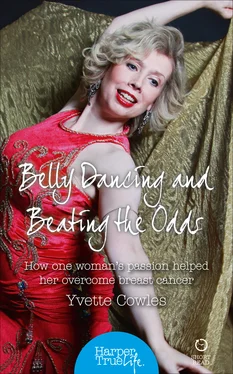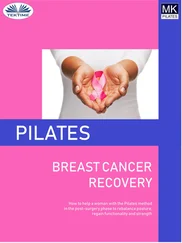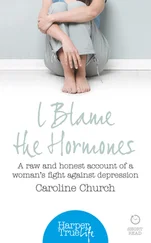I was devastated. ‘Why me, and why so young?’ I asked myself. I didn’t know anyone my age with cancer. Besides, I just didn’t have time to be ill. I had loads of deadlines coming up at work, not to mention a dance show and classes to prepare for. A few days after being diagnosed, I went to see the surgeon at the Royal Marsden Hospital, who told me that I would have to come in for surgery the following week. My boyfriend looked on in horror as I told the surgeon in no uncertain terms that it would be impossible as my assistant was going to be on holiday. The surgeon shook his head, ignored my protests and I was admitted a few days later.
I was really anxious about being disfigured. Before the operation, the surgeon marked the area to be removed with a black marker pen. It looked like a sizeable chunk to me. ‘Do you really need to take away that much?’ I asked him. Apparently they did. I came back from surgery heavily bandaged up and the nurses were sensitive to my concerns, only removing them when I felt ready to see the scars. There was a noticeable dent but it wasn’t so bad; I had prepared myself for worse.
It was a small ward and my fellow patients were lovely. They were different ages and at different stages of their treatment, but we all supported each other. I also had an endless stream of visitors, including my belly dance buddies. They transformed my drab little cubicle into a sequined boudoir and bought a flurry of much-needed fun and colour. Their antics really cheered me up – not to mention the rest of the ward. My close friend and dance partner, Margaret, even turned up one day carrying a huge black bin-liner, with a pink plastic arm protruding from it. With great glee she removed an inflatable man – complete with a strategically placed banana and a pair of her three-year-old’s underpants. We nicknamed him Dick Rogers and he became the ward mascot, moving from one bed to another as they became vacant during the course of the week. In fact, by the time I left, the nurses had become so attached to him that I thought it only fair to leave him in their capable hands.
During my operation the surgeons had removed some lymph nodes under my arm, to see if the cancer had spread. Thankfully, they were all clear. We then had to decide on the course of follow-up treatment. Because the cancer had been at such an early stage, there were several options open to me: radiotherapy, tamoxifen – an anti-oestrogen drug – both of the above, or neither. I opted for both, as I wanted to give myself the best possible chance of ensuring that the cancer didn’t come back.
Radiotherapy was a daily business. The treatment itself lasted only a few minutes but the whole procedure could take ages if you had to wait, or if, as happened sometimes, the equipment broke down. I was lucky that I worked in Hammersmith and could commute to work afterwards. It was fine at first, but I did get progressively more tired as the course went on. But my manager and the rest of the team were very supportive. I even managed the odd dance class, although I just went through the paces and had to be careful with my arm.
I was just grateful that the cancer had been caught at a very early stage and that I’d got away without a mastectomy and chemotherapy. I was also immensely relieved that I was being treated at the Royal Marsden. I knew I was in safe hands there, and getting the best care that the NHS could provide. And I supplemented all the medical treatment with a course in acupuncture and some spiritual healing. I felt tired and rather fragile, but listening to Arabic music and choreographing new dances in my head, plus the support and camaraderie that I got from my students and fellow dancers, really got me through a difficult time and made me determined to get better so I could perform again.
Just as importantly, the dancing helped me reconnect with my body. Like a number of women I’ve spoken to, I couldn’t help feeling that my body had let me down. How dare it do this to me! My complex about my weight, my generous bottom and other perceived defaults, was now compounded by concerns about the big dent in my breast and the ugly scar in my armpit. But allowing myself to enjoy the flowing and sensuous movements made me feel better about myself; it was a relief to know that I could still feel womanly.
Once I’d been through the treatment, I tried to put the whole cancer episode behind me. I was still taking tamoxifen, but other than that, I just needed to attend regular check-ups and have an annual mammogram. The consultant said that there was a 25–40 per cent chance of the cancer coming back, but I preferred to ignore those statistics. Back then there wasn’t a great deal of support for younger women with breast cancer and my circumstances were different from those of the older women I’d met. Rather than dwell on what I saw as an unfortunate ‘blip’, I wanted to move on and get on with my life. Up to that point, I’d felt invincible; no matter how much I punished my body, it always bounced back. I had to hope that this time would be no different.
Chapter 3
Escape to France
My dancing and publishing careers both went from strength to strength. I was promoted to Non-Fiction Marketing Director and enjoyed all the kudos that went with it – the big campaigns, the launch parties, working with some of the biggest names in publishing. Every day was different, with new challenges and new experiences; I never knew what to expect. I loved my job and couldn’t have been happier.
At the same time I was pursuing my love of dance. I taught regular classes at Jacksons Lane in North London and organised shows and parties for my students. I hosted workshops for international teachers and I went to courses with top dancers in Paris, Berlin, New York and San Francisco. I met some fantastic women and inspirational dancers – my network of belly dance buddies had gone global!
Over the years I have been to Egypt many times, but it was my first visit to Cairo, irresistible to any belly dancer, that made an indelible impression on me. I went on a trip organised by a work colleague, whose father was general manager of the Cairo Sheraton Hotel. From the moment the plane touched down, I was dazzled: the smells, the noise, the colours and the vibrancy of the city, that some in our party found quite overwhelming, were all magical to me. One evening, a member of our party suggested that we went to a belly dance show at the hotel’s night club, as the dancer-in-residence was apparently ‘Egypt’s biggest star’. After the meal a seemingly endless succession of singers, folkloric dancers and entertainers took to the stage. Then, at 3am, the dancer appeared. It was Fifi Abdou herself! She was older and considerably less svelte than on the grainy videos I had seen of her, but even more compelling in the flesh; the archetypal maalima or boss woman, with a relaxed yet commanding style – and the best shimmy in the business.
For the next two hours Fifi danced, entertained, sang, smoked a shisha pipe and told jokes, through a variety of costume changes, from a startling purple and yellow bedlah to a fitted baladi dress to the man’s traditional galabeya she wore to perform the raqs el tahtib or men’s stick dance. There were undoubtedly more elegant and refined dancers, but none with her energy, exuberance and sheer joie de vivre . I idolised her for her dancing, and for dragging herself up from poverty to become not just Egypt’s best-paid belly dancer, but the richest woman in Egypt. Fifi had dealt with a number of obstacles along the way; the fundamentalists who regularly denounced her and the ‘morality police’ who decided that her movements were so lewd that they threw her into jail more than once. Undaunted by such setbacks, she continued to do what she loved most. What a woman! I would have been happy with an ounce of her nerve and courage.
Читать дальше












